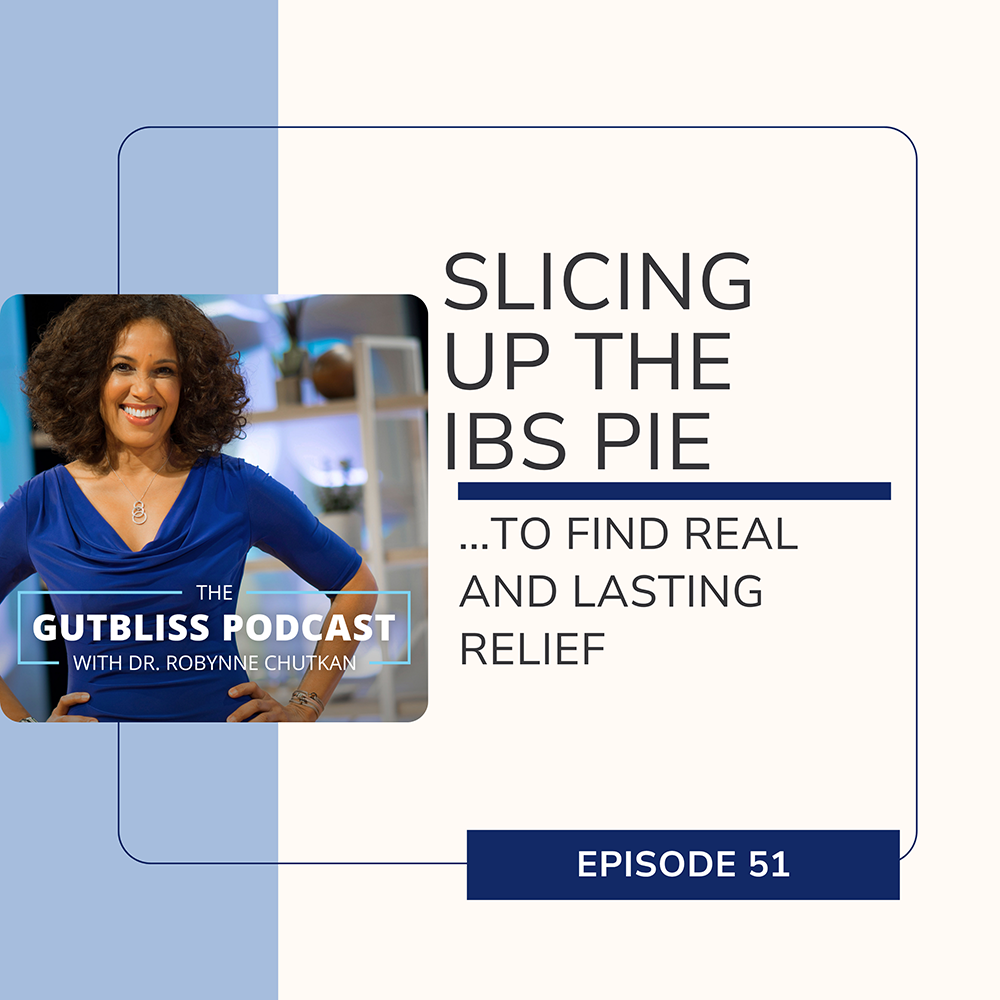This week’s episode is another example of why you should reject a blanket diagnosis of irritable bowel syndrome, and ask your doctor to roll their sleeves up and help you uncover the root cause of your symptoms. The solution for everyone who’s diagnosed with IBS is not always a diet change. But it should never just be “your bowel is irritable and here’s a drug”.
Thank you for being a part of our community! For the latest in digestive wellness go to https://gutbliss.com/ and follow us on Instagram for more gut health info.
On today’s show, I want to tell you about a patient I saw years ago named Leslie who was in her early twenties and came to see me because of frequent abdominal pain, constant bloating, and occasional vomiting or more accurately – regurgitation of food where it would come up into her mouth. In my intake form before somebody comes to see me there is a pretty extensive section where I ask you to describe what you eat in a typical 24 to 48 hours. Leslie reported: a bagel with cream cheese or an English muffin with jelly for breakfast, chicken nuggets and fries for lunch, and pasta with butter for dinner, plus Gatorade or soda. Rarely any fruit and no vegetables ever—she said she didn’t like the taste or the texture. I was curious how long Leslie had been eating like this, and since her mother had accompanied her to the first visit I asked her about her eating habits as a child. Leslie’s mother told me she had always been a very picky eater, and she and her husband had been so frustrated and worn down by Leslie’s pickiness that they had eventually just let her eat whatever she wanted.
Now, I want to point out that neurodivergent children can sometimes have strong preferences or aversions to specific food textures because of sensory processing difficulties. Some of those children will only eat soft, creamy textures, and some will reject chewy or mushy foods like meat and vegetables. These texture sensitivities can really impact their diet and make it challenging for their parents to get sufficient amounts of food into them. And so there often have to be compromises in what they’re eating. But Leslie wasn’t dealing with sensory processing issues or an eating disorder. She had simply trained her parents from childhood to provide her with the foods she wanted. When we come back – dealing with a delicate diagnosis.
Leslie’s diagnosis was something I call “Crummy Diet Syndrome”, and trust me, that can be a lot more challenging to treat than other GI conditions. Because the evaluation usually doesn’t turn up anything definitive, like gallstones, or colitis, or reflux, many people like Leslie with crummy diet syndrome end up being given a diagnosis of irritable bowel syndrome – IBS. And I also want to mention another delicate point here and this is the idea of secondary gain. Leslie’s GI problems had become her lifeboat: her rationale for why she couldn’t get up early enough to make it to class, finish college, get a job, or cook a meal.
I’m not trying to make light of her situation, or anyone else who finds themselves in a similar predicament. It’s an absolutely paralyzing position to be in, and it’s not that difficult to see how it can develop. When my daughter was little and had a sore throat and fever, she got to stay home, sleep in, hang out in her pajamas all day, eat popsicles, and watch movies. We gave her lots of cuddles and told her how sorry we were that she wasn’t feeling well. She liked school, but school and homework can have a hard time competing with the kind of attention you get when you’re sick. And that desire to just get a pass from life’s responsibilities and challenges isn’t malingering; it’s human nature. And lots of coddling and sympathy when kids are sick isn’t bad parenting. But it can leave some people yearning for that feeling of suspended responsibility and being taken care of that can seductively follow them into adulthood. It may contribute to a persona that focuses on illness rather than health, where a diagnosis can unfortunately become a crutch for avoiding challenges and responsibilities.
And here’s another problem: Sometimes people feel like they have to exaggerate and embellish because otherwise they won’t be taken seriously, especially with conditions like IBS, where there’s a tendency for the medical establishment to assume it’s all in your head. Could Leslie have had a rare, undiagnosed disorder that was responsible for her symptoms rather than just poor eating habits? Medicine is full of stories of people who have had rare conditions, were labeled hypochondriacs for decades, and then were finally vindicated when some expert diagnosed them. But in this case, the reality is that Leslie had a daily stomachache primarily because of her nutrient-poor, overprocessed diet.
Leslie been to multiple doctors. In conversations with me they all expressed the same skepticism about her symptoms, but never to Leslie or her family. Her diet was the elephant in the room—but no one was talking about it. She’d had an extensive medical workup at two excellent clinics: upper endoscopy, colonoscopy, video capsule endoscopy, gastric emptying studies, small bowel barium exams, ultrasound, CAT scans of the abdomen and pelvis, gallbladder scans, tilt table studies, brain MRIs, and multiple blood tests looking for everything from Lyme disease to cancer. She had tried a dozen different prescription medications without any improvement. By the time she came to me, there wasn’t anything else to be done other than to have a frank conversation.
The first thing I said to Leslie was that I believed she didn’t feel well and was suffering, which was the absolute truth. I also told her that there had been enough tests and that I didn’t see the need to do any more. Instead, I wanted to focus on what we needed to do to improve things, and how much better her life was going to be when she felt well. Instead of dwelling on a name for her diagnosis or the science behind it, I simply referred to it as “her symptoms”. We found a therapist she liked whom she could discuss things with. After about a year Leslie dropped a bit of a bombshell on me.
After more than a year of seeing her, Leslie finally felt comfortable revealing a history of a restrictive eating disorder as a teen, which had never been acknowledged by her parents despite tremendous weight loss and social withdrawal. The cognitive behavioral therapy with the therapist ended up being far more helpful than any of the IBS medications she’d been on in the past, although it was still very slow progress. I assured Leslie we would also be taking baby steps with her diet, focusing on what was missing rather than what she had to cut out. She made a pact with me to add one fruit, one vegetable, and one glass of water a day to her diet. There were no other rules or restrictions.
She started with carrots, progressed to peas, and after about six months she was experimenting a tiny bit with string beans and asparagus. She didn’t mind blended fruit, so we started alternating her usual breakfast bagel with smoothies made with berries, bananas, and coconut milk pus a little spinach blended in. Chicken nuggets and fries were still in heavy rotation, but she was also working rotisserie chicken and baked sweet potatoes into the mix and occasionally adding broccoli to her pasta. She surprised me by offering to go cold turkey on the Gatorade and soda if she could have sparkling water mixed with fruit juice instead.
Slowly but surely, things started to improve—she didn’t look or feel as bloated, she stopped complaining about pain and vomiting, and her skin that had been very acne prone started to clear up. I don’t know whether she ultimately finished her degree or got a job because she eventually stopped coming to see me. But I did feel a shift with Leslie: an unspoken nod to the idea that things could be different, that she could be a little sick instead of a lot sick, and that her illness did not need to define her so completely.
I want to leave you with three takeaways about dealing with a delicate diagnosis like “Crummy Diet Syndrome”:
1. The diagnosis is delicate because in order to see meaningful change you have to approach this in a different way from just saying “this is your fault. You’re eating poorly and that’s why you feel sick. And it’s all your fault”.
2. I always recommend focusing on what people are missing rather than the not so great stuff they’re eating. You can overcome a lot of chicken nuggets and fries with more green vegetables, more unprocessed whole grains, more fruit.
3. Leslie’s story is another example of why we want to reject this blanket diagnosis of irritable bowel syndrome and actually roll our sleeves up and look for the root cause. Leslie had been on more than six different medications, and I can tell you that none of them helped her symptoms. The solution for everyone who’s diagnosed with IBS is not always a diet change. Sometimes it’s an undiagnosed food intolerance or an unacknowledged parasite or an anatomical or hormonal problem. But it’s never just your bowel is irritable and here’s a drug.
So that’s it for this episode of the Gutbliss Podcast on the delicate diagnosis of “Crummy Diet Syndrome”. Coming up next week – more stories from the IBS vault.









